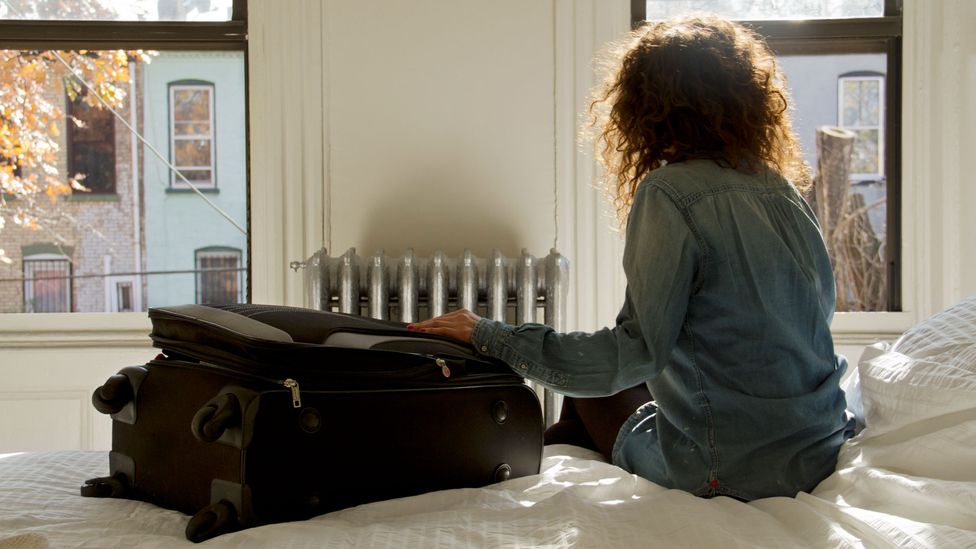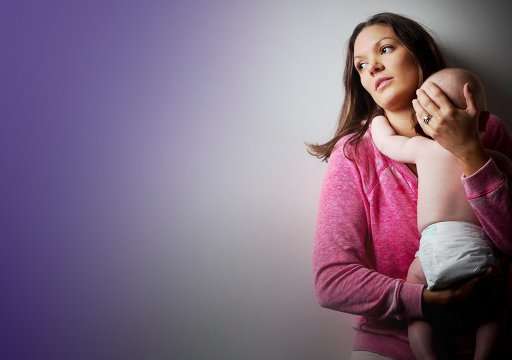 https://ychef.files.bbci.co.uk/1600×900/p0bvzryz.webp
https://ychef.files.bbci.co.uk/1600×900/p0bvzryz.webp
By Maddy Savage 22nd March 2022
When mums leave their kids with family or partners, they are often viewed as deeply flawed, despite gains in gender equity. Will this ever change?
Quitting a job because she doesn’t like it, leaving a city that no longer suits her needs or ending a relationship with someone she’s no longer in love with – in recent decades, Western society has championed women who make these kinds of empowering choices. But what if the choice she makes is to leave her kids?
Despite improving gender equality, mothers who make the difficult decision to live apart from their children are often anything but celebrated.
“Even if both parents are doing a brilliant job of raising happy, healthy kids, [if] they happen to live away from their mum, the women are still vilified,” says Melissa, who lives an hour and a half drive from her two children, and administers an online support group for women in similar situations. “[These] mothers are spoken of as if they are defective, like something deep within their core is broken.”
The recent Netflix production of The Lost Daughter has shined a light on this kind of response to mothers who live separately from their kids. The film, based on the novel of the same name by Elena Ferrante, zooms in on actress Olivia Coleman playing the role of a mother who leaves her children with her husband for three years to pursue her own career goals. Both she and others frame her decision as selfish, which contrasts with a father in the movie who has also left his children (played by Ed Harris), seemingly without much judgement.
Though in real life parents of all genders have walked away from their children for centuries, there is some anecdotal evidence to suggest that mums leaving might be on the rise. Melissa says membership of the online support group she administers is in its hundreds and growing steadily. And therapists like Reennee Singh, a spokesperson for the UK Council for Psychotherapy (UKCP), say they are noticing a “slight shift” towards more mothers choosing to relinquish live-in parenting.
Data from the UK and the US also suggests a rise in the proportion of single-father households, though this doesn’t distinguish between families where children still spend a significant portion of time with their mothers – or don’t – or how such childcare arrangements were decided.
My children had a father and extended family who loved them, routines and a home. Leaving was about saving myself. Once you hit rock bottom, you have to get creative – Natalie
Whatever the exact figures, the issue of women – rather than men – leaving the family unit still creates a lot of debate in Western cultures. For example, one of the tensions in the film The Lost Daughter (hinted at in the title), is the question: has a daughter been abandoned by her mum, or, conversely, is the mum who leaves her daughters the “lost one,” underlining that there continues to be deep emotional response to this behaviour. In many ways this may seem surprising, given the tidal wave of societal and media support for gender equity in other parts of society.
“Blended families, same sex parents – we’ve accepted these to a greater extent than we have working mothers who are parenting at a distance,” says Tom Buchanan, a professor of sociology at Mount Royal University in Calgary, Canada. “There’s a cultural lag.” And, say experts, this may not change anytime soon.
The reasons for leaving home
Academics and therapists following the “slight shift” towards more mothers choosing to live apart from children say there is a wide spectrum of reasons why this may be happening.
Some leave to take up jobs, assignments or study opportunities in different cities, either while remaining in a relationship with their children’s father or after a separation. “Times have changed sufficiently for women to feel more comfortable and entitled to pursue their own careers, their own interests,” says Singh, “even if that means living away from [the family] home.”
Other women decide it’s preferable for their children to reside with their father after a break-up for practical or financial reasons. “The children were living in a lovely home on a farm in the country and they were in good schools with lovely friends,” says Melissa. “I didn’t know how I was going to afford to house [them]”. By leaving her kids with their father, she was able to re-establish her career as a freelancer in the media, and move to a cheaper neighbourhood closer to her extended family. “I was pretty run down by what went on in the marriage, too, and needed time to recover.”
Elsewhere along the spectrum of choice there are mothers who leave home for a different kind of lifestyle or relationship.
“I just felt trapped, completely trapped in a situation,” says Katy, a teacher who left her five children with their father in 2018 and moved to a different part of Europe. “I got married when I was 22, I had my first child at 25 and then it was ‘boom, boom, boom’ – child after child after child. And although they were what I wanted at the time, I don’t feel like I actually got to do anything that was for me.”
At the far end of the choice continuum are mothers fleeing toxic relationships. For this group, leaving their children behind may be something of a last resort to overcome serious mental health issues and move forward with their lives.
That was the case for Natalie from Australia, who became severely depressed while she was living abroad with her ex-husband. She says the dynamic between them wasn’t healthy, but that he was a great caregiver to their children, so she ended up moving back to her home country without them.
“My children had a father and extended family who loved them, routines and a home. Leaving was about saving myself,” she says. “Once you hit rock bottom, you have to get creative.”
Singh believes rising public awareness of wellbeing is feeding into mothers’ decisions to leave the family nest, in contrast to previous generations, where women often felt they had to put up with existing domestic arrangements. For example, contemporary self-help books and podcasts about separations or self-care can offer comfort and validation to those who’ve made the difficult decision to live apart from their children.
However, Singh warns some of this literature only exists because of ongoing stereotypes about motherhood, and she’s concerned some women may feel they need to use discourses about wellbeing “to warrant or legitimise what they are doing”.
“If society was more equal and more fair, then they might not have to rely so much on the literature to feel comfortable with the decisions that they make. I try and help women to become stronger and more grounded in their choices and, you know, think, ‘oh, well, society can say ‘whatever’, but this is what I want to do at this point’,” she argues. “Sometimes this option is the only one that presents itself to them… [so it’s] also just helping to give them permission to leave and feeling that that’s OK.”
A persistent stigma
The freedom to leave hasn’t resulted in freedom from judgement. Women – especially in the West – still tend to face negative reactions from friends, family and wider society for the unconventional decision to live apart from their children, whatever the reasons behind it.
“The common theme in the [online] group is how surprised the women were by the confines of what society [still] expected of them,” says Melissa. She says even members who live apart from their children to pursue career paths in the military or for the sake of postgraduate studies have shared experiences of being “vilified” for their choices. New acquaintances will often ask members, “‘what do you mean your kids don’t live with you? What sort of mother doesn’t want to be with her own children?’”, she says. “Like it’s a simple choice that only the mother can possibly make. Like fathers have no input or say or responsibility at all”.
New acquaintances will often ask, ‘what do you mean your kids don’t live with you? What sort of mother doesn’t want to be with her own children?’ – Melissa
According to Singh, this is largely because discourses and expectations about motherhood haven’t shifted at the same pace as women’s progress in other areas. In other words, women are still expected to play the role of a nurturer, regardless of other external circumstances. “There’s still some stigma attached to women sort of abandoning their duties and responsibilities,” she says. “It’s got a lot to do with history, cultural ideas and gendered relationships.”
She points out that this narrative is particularly common in Western individualistic cultures, in contrast to more collective societies. “In the Philippines or in India, it’s quite common for women to go and earn money in a different country and send it back home while their children are being looked after by the extended family or by grandparents.”
For women in these Western cultures who fly the family nest to pursue a specific lifestyle or relationship, the stigma is often even more acute than for those who leave for practical or career-related reasons. Katy says many of her relatives didn’t speak to her for months, even though the decision for her children to remain in the family home instead of going with her was, she says, made mutually with their father.
“A man can do this and have no contact with their child, and it’s acceptable,” says Katy. “But if a woman does it – and I still have contact with my children – people do think I’m a bad mother, [that] I’ve abandoned them. I thought I was doing the best for them,” she says, stating that if she’d stayed, her exhaustion and unhappiness would only have escalated. “I didn’t realise at the time all the consequences, all the judgements I would get.”
Four years after her move, Katy says some friends and family members still perceive her as “a bad mother” and blame any challenges her children experience on her decision to leave.
Sharing her story with new friends hasn’t helped ease the burden; several people she became close to distanced themselves from her after learning about her past, so now she avoids talking about her children at all. “It’s difficult because for every day you think ‘yeah, actually what I did took a lot of guts’, then somebody will make a comment, and it just puts you back down to thinking you’re the worst person in the world.”
Melissa says women who admit domestic abuse was a factor in them leaving – even if they believed their former partner would not hurt their children – face “perhaps the cruellest” judgements from others. “In domestic violence, women barely get out alive, let alone with their mental health intact,” she says. Yet this cohort of mothers will still be asked by both strangers and people they know “how could you do it?” or “are the kids OK with it?”. “Very rarely do people ask ‘how are you?’ ‘are you ok?’,” says Melissa.
Views of fatherhood contribute to mothers’ burdens
Historically, fathers who leave the family home have been much more accepted in both society and in popular culture than mothers, agrees Buchanan. He cites veteran US singer Bruce Springsteen’s track Hungry Heart, which begins with the lyrics “Got a wife and kids in Baltimore, Jack, I went out for a ride and I never went back”.
Part of this acceptance is down to societal stereotyping of men as well as women: fathers have traditionally been viewed as less capable caregivers than mothers. It’s also about the value that is attributed to unpaid domestic work like childcare, in comparison to salaried jobs, argues Buchanan. This has fed the narrative that it’s more acceptable for men to leave home if they’re contributing financially, whereas women are seen to be abandoning their domestic duties. “Fathers are more likely to just perceive [paid] market work as ‘work’. And until that changes, I think you’re going to see a lot of pressures on women,” he argues. “Fathers need to embrace and address and challenge the stigma that they are only the ‘breadwinners’, not necessarily the ‘parents’.”
Buchanan believes that despite all this, today’s walk-away dads are “not un-stigmatised completely” and “probably don’t have a great reputation”. However, he accepts there is a “different level of stigma” for women who leave their families under these sorts of circumstances. “When it happens in a mothering situation, it becomes a huge deal and it becomes gendered.”
Singh adds social stigmas can even play a role in how children respond to their mother’s decision to move out of the family home. She’s worked with a lot of adult clients who witnessed parental infidelity growing up, and says people tend to judge mothers who leave more harshly than fathers, and find “it’s hard to forgive them, even later on in life”.
Managing from afar
Natalie describes her connection with her children as “very close” and says they speak several times a week, text regularly and visit one another. “The quality time we have when we are together is magical and normal. We pack in a lot of fun, and I’m there to manage dramas and homework, too.”
By contrast, Katy says she’s found it challenging to maintain regular contact with some of her five children, and has a particularly fragile relationship with her eldest daughter. Yet, while the pandemic has made it trickier for her children to visit, she says she has been able to offer them the kind of quality family time that was challenging when she was juggling live-in parenting with anti-social working hours.
It’s difficult because for every day you think ‘yeah, actually what I did took a lot of guts’, then somebody will make a comment, and it just puts you back down to thinking you’re the worst person in the world – Katy
“We go to the beach, we go out, have picnics in the park together… things like that,” says Katy. “I don’t regret my decision. I did what I felt I had to do at the time. I do regret that I put the children through that because I think for them it’s been hard. I would like one day for my children to grow up and look at me as in like ‘well, my mum wasn’t happy, but she didn’t just put up with the situation. She did something about it’.”
In the online support group, many women regularly share feelings of guilt, social isolation and ostracisation, says Melissa, because it’s difficult to discuss what they are going through with others. “The most common remark made by new members of our group is how incredibly lonely they have been. They say finding our group helps because they feel understood and not demonised by their circumstances.” She believes wider societal attitudes need to change, with a better understanding that “the women who leave… love their children as much as mothers who live more traditional lives.”
A more accepting society?
Whether society will eventually become more accepting of mothers who live apart from their children remains a matter of debate.
Buchanan believes things will improve, but only in certain circumstances. “If it’s a career-oriented move, then I think that’s something that we will move past, in terms of stigmatising,” he says. This, he argues, will be a side effect of a more general improvement in gender equity in the home and in the workplace, with fathers becoming increasingly involved at home and more women in leadership positions. “Stepping away from a family just because they wanted to pursue something different – I think that’s always going to be stigmatised.”
“I don’t think things will change very much in the future,” agrees Melissa, the support-group administrator. Ten years since moving out of her family home, she says she’s seen little progress in societal attitudes towards live-apart mothers like her.
Natalie, however, is more hopeful that women who leave the home for non-career related reasons will find their choices more “normalised” in future “with enough education and awareness”. But for this to happen, she says society also needs to become more open to the idea of fathers being equally equipped caregivers. This kind of shift, argues Singh, also needs to sit alongside a broader, more respectful acceptance of the full range of options open to modern working women, beyond traditional models of domesticity.
“Whether having children later in life, not having children at all, having children and then for somebody else to be the primary carer of their children, there’s a lot of work for us as women to do, just to feel more comfortable with the fact that there are choices available nowadays,” she argues. “It’s fine to choose something a bit different… each of these choices comes with a cost.”
Melissa, Katy and Natalie’s surnames have been withheld to protect them and their family’s privacy

